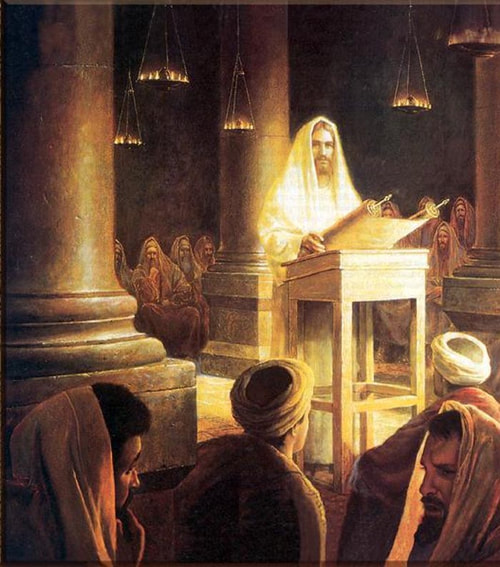The Gospel According to St. John
The King James Bible
|
John 7:25-36
Jewish leaders try to arrest Jesus 25 Then said some of them of Jerusalem, Is not this he, whom they seek to kill? 26 But, lo, he speaketh boldly, and they say nothing unto him. Do the rulers know indeed that this is the very Christ? 27 Howbeit we know this man whence he is: but when Christ cometh, no man knoweth whence he is. 28 Then cried Jesus in the temple as he taught, saying, Ye both know me, and ye know whence I am: and I am not come of myself, but he that sent me is true, whom ye know not. 29 But I know him: for I am from him, and he hath sent me. 30 Then they sought to take him: but no man laid hands on him, because his hour was not yet come. 31 And many of the people believed on him, and said, When Christ cometh, will he do more miracles than these which this man hath done? 32 The Pharisees heard that the people murmured such things concerning him; and the Pharisees and the chief priests sent officers to take him. 33 Then said Jesus unto them, Yet a little while am I with you, and then I go unto him that sent me. 34 Ye shall seek me, and shall not find me: and where I am, thither ye cannot come. 35 Then said the Jews among themselves, Whither will he go, that we shall not find him? will he go unto the dispersed among the Gentiles, and teach the Gentiles? 36 What manner of saying is this that he said, Ye shall seek me, and shall not find me: and where I am, thither ye cannot come? |
Margin Notes:
"Do the rulers know." (7:26) - Means; "Do the Jewish leaders know." "Howbeit we know this man." (7:27) - "But we know this man." "When Christ cometh, no man knoweth whence he is." (7:27) - "When Christ comes, no one will know where He came from." A Jewish tradition falsely taught that the Messiah would appear suddenly out of nowhere. They would have known the truth of where the Messiah came from and that Jesus fulfilled the old prophesies if they read Micah 5:2. "Then cried Jesus." (7:28) - Means Jesus cried out. This is one of the few times Jesus raised His voice, perhaps to highlight what He was about to say. "Ye both know me, and ye know whence I am." (7:28) - They knew Jesus and that He was from Nazareth. Unfortunately, they did not believe He was the Son of God. "He that sent me is true." (7:28) - An essential truth that Jesus repeats in John 8:26. See also John 3:33 (lesson 169). "Then they sought to take him: but no man laid hands on him." (7:30) - "Then they sought to arrest Jesus, but no man could lay a hand on Him." They could not arrest Jesus because his time had not yet come. God's divine plan called for Jesus to be arrested later, in Gethsemane, thus giving Him more time to prepare His church. See also John 8:20. "The Pharisees and the chief priests sent officers to take him." (7:32) - The officers were Temple guards, not Roman soldiers. We will learn what happens when the guards meet Jesus in lesson 182. "Then said Jesus." (7:33) - Jesus is finishing His interrupted thought from verse 7:29. "For where I am." (7:34) - Means, "For where I will be." "Will he go unto the dispersed among the Gentiles." (7:35) - "Will He go to the Jews scattered among the Gentiles." |
New Living Translation
John 7:25-36
Is Jesus the Messiah?
25 Some of the people who lived in Jerusalem started to ask each other, "Isn't this the man they are trying to kill?
26 But here he is, speaking in public, and they say nothing to him. Could our leaders possibly believe that he is the Messiah?
27 But how could he be? For we know where this man comes from. When the Messiah comes, he will simply appear; no one will know where he comes from."
28 While Jesus was teaching in the Temple, he called out, "Yes, you know me, and you know where I come from. But I'm not here on my own. The one who sent me is true, and you don't know him.
29 But I know him because I come from him, and he sent me to you."
30 Then the leaders tried to arrest him; but no one laid a hand on him, because his time had not yet come.
31 Many among the crowds at the Temple believed in him. "After all," they said, "would you expect the Messiah to do more miraculous signs than this man has done?"
32 When the Pharisees heard that the crowds were whispering such things, they and the leading priests sent Temple guards to arrest Jesus.
33 But Jesus told them, "I will be with you only a little longer. Then I will return to the one who sent me.
34 You will search for me but not find me. And you cannot go where I am going."
35 The Jewish leaders were puzzled by this statement. "Where is he planning to go?" they asked. "Is he thinking of leaving the country and going to the Jews in other lands? Maybe he will even teach the Greeks!
36 What does he mean when he says, 'You will search for me but not find me,' and 'You cannot go where I am going'?"
This second Bible text from the "New Living Translation" (Tyndale House, Publishers, Wheaton, Illinois) is a paraphrase and not an accurate word for word translation of the Bible. However, it is a helpful tool when read with the "King James Version."
Today's question:
1. Was Jesus deliberately vague when He referred to God as "he that sent me?" (7:28)
Please let me know your suggestions on improving the lessons. I value your input.
1. Was Jesus deliberately vague when He referred to God as "he that sent me?" (7:28)
Please let me know your suggestions on improving the lessons. I value your input.
Answer: (Do you agree?)
1. Yes, Jesus often used unclear words or parables to baffle His enemies. To people who wanted to learn, Jesus' words made perfect sense and were filled with deep spiritual meaning. Scoffers with closed hearts wondered why anyone would follow Jesus and His confusing message.
Application thought for the day:
Why is verse 7:30 important?
1. Yes, Jesus often used unclear words or parables to baffle His enemies. To people who wanted to learn, Jesus' words made perfect sense and were filled with deep spiritual meaning. Scoffers with closed hearts wondered why anyone would follow Jesus and His confusing message.
Application thought for the day:
Why is verse 7:30 important?
Thanks to the writings and commentary of John Wesley and Adam Clarke. Also, "The Layman's Bible Study Notebook" by Irving Jensen published by Harvest House Publishing, Irvine, California; the "Life Change Series" published by NavPress Books, Colorado Springs, Colorado; the "Life Application Study Bible" published by Tyndale House Publishing, Carol Stream, Illinois; the "Quest Study Bible" published by The Zondervan Corporation, Grand Rapids, Michigan; "Robertson's New Testament Word Studies; " "The MacArthur Bible Commentary" by John MacArthur published by Thomas Nelson, Nashville, Tennessee; "Wisdom of the Bible" CD by Topics Entertainment, Inc., Renton, Washington for their inspiring pictures; "My utmost for His Highest" by Oswald Chambers published by Barbour Publishing, Inc., Uhrichsville, Ohio; The "Treasury of Scriptural Knowledge" by Reuben Archer Torrey; "Hope For Each Day" by Billy Graham published by J. Countryman, a division of Thomas Nelson, Inc., Nashville, Tennessee; "Easton's Bible Dictionary" by Matthew George Easton; "Unger's Bible Dictionary" by Merrill F. Unger, published by Moody Press, Chicago, Illinois; "Halley's Bible Handbook" by Henry H. Halley, Zondervan Publishing House, Grand Rapids, Michigan; "The Everyday Bible" published by World Wide Publications, Minneapolis, Minnesota; "The Living New Testament" published by Tyndale house; "The New Living Translation" published by Tyndale House; "The New Testament" translated from the Latin Vulgate, published by Guild Press, New York, New York; BibleGateway.com for all their wonderful links; and of course the "King James Bible." All were critical in putting these lessons together.
© 2021 evolke
© 2021 evolke




